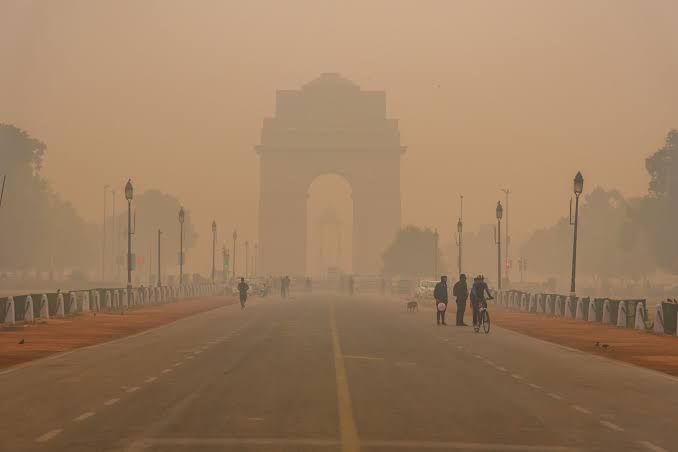The Commission for Air Quality Management at the Center has requested that authorities aggressively implement PUC (pollution under check) regulations for automobiles and keep a close eye on waste facilities to prevent any fires.

The state pollution control boards of NCR and DPCC, as well as other relevant agencies, have been notified of the need for stringent implementation of GRAP stage steps.
1. First, the Commission for Air Quality Management (CAQM) has urged all NCR national and state governments to strictly follow stage I air quality management plans.
2. The Commission has also requested that residents work together to uphold the citizen charters established at each development stage.
3. Consequently, on October 5, an order was issued for invoking actions under Stage I of the GRAP -‘Poor’ Air Quality (DELHI AQI between 201-300).
New Delhi
The air quality in Delhi and the surrounding areas has deteriorated to unhealthy levels, hence the Commission for Air Quality Management (CAQM) in New Delhi has ordered agencies to rigidly implement measures under Stage I of the Graded Response Action Plan (GRAP). Depending on the degree of air pollution, the government of the capital and its surrounding areas implement GRAP, a set of anti-air pollution measures.
Measures taken to reduce air pollution are being evaluated by the Commission for Air Quality Management in the National Capital Region and Adjoining Areas (CAQM), which is also keeping a close eye on air quality parameters in the NCR in light of weather forecasts and an air quality “poor” category index.
Consequently, on October 5 an Order was issued for invoking actions under Stage I of the GRAP -‘Poor’ Air Quality (DELHI AQI between 201-300). The updated GRAP mandates the implementation of a 24-point action plan for the whole NCR beginning on October 5.
This 24-point action plan includes things like the regular lifting of municipal solid waste (MSW), C&D waste, and hazardous wastes from dedicated dump sites, and the closure of construction and demolition (C&D) activities of projects with plot sizes equal to or more than 500 sq m that have not registered on the “web portal” of the respective NCR and state governments.
Air Quality Index
On Sunday around 4 p.m., the Air Quality Index (AQI) for Delhi had risen to 232 from 186 the day before. Specifically, 286 were found in Ghaziabad, 229 in Faridabad, 258 in Greater Noida, 231 in Gurugram, and 258 in Noida. (An AQI of 0–50 is deemed “good,” 51–100 is “satisfactory,” 101–200 is “moderate,” 201–300 is “poor,” 301–400 is “very poor,” and 401–500 is “severe.”)

The air quality in Delhi deteriorated for the first time, in nearly three months on October 5, marking the first day with bad air quality in almost three months. Following that, there was also an extended period of rain, which extinguished the agricultural fires and contributed to the continued cleanliness of the air.
On October 10 (with a reading of 41), the air quality index (AQI) in Delhi reached its point of lowest quality since August 31, 2020.
“At its meeting on October 5, the subcommittee formed for invoking activities under GRAP opted to invoke all steps as envisioned under Stage I of GRAP (AQI 201-300). There is no expiration date on the order, “A statement from the Union’s Ministry of the Environment confirmed this.
Unregistered Activities Halted
Construction and demolition activities at sites with plot sizes equal to or greater than 500 square meters that are not registered on the “web portal” of the respective states for remote monitoring of air pollution levels are recommended to be halted under Stage 1 (poor air quality) by the Center’s Commission for Air Quality Management (CAQM).

It is the responsibility of the project backers to monitor the building sites to make sure that the rules for controlling dust, disposing of debris, and using anti-smog equipment are being followed.
Agencies are responsible for enforcing bans on open burning of biomass and municipal solid trash, and for ensuring periodic mechanized sweeping of roadways and water sprinkling.
For the purpose of preventing fires, the authorities need to vigorously enforce the PUC (pollution under control) standards for automobiles and maintain a tight watch on landfills and dumps.
The government is responsible for enforcing harsh penalties for those who do not comply with regulations and ensuring that all businesses and thermal power plants utilize only fuel that is authorized. You can examine the Commission’s amended GRAP schedule in its whole and in great detail by going to caqm.nic.in.
Read more: Illegal mining erodes 40% of Aravalis expanding Thar desert into Delhi NCR













